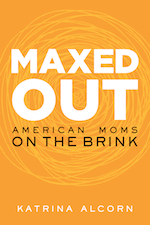As you may have heard, women still make only 77 cents on every dollar a man earns, and in recent years, progress on closing the pay gap has nearly ground to a halt. On Wednesday, the Paycheck Fairness Act, which was supposed to right this wrong, was defeated on the Senate floor.
I’ll try not to get too wonky about this, because it’s Friday, but there are a few things I think you should know.
What often gets left out of the whole pay gap discussion is that it not just about women, it’s about mothers in particular. Here’s how the pay gap breaks down: [1]
- Women without children make 90 cents to a man’s dollar
- Mothers make 73 cents to a man’s dollar
- Single moms make 56-66 cents to a man’s dollar
If those numbers don’t make you queasy, maybe this will: [2]
- Mothers are 79% less likely to get hired and 100% less likely to be promoted.
- Studies show mothers are held to higher performance and punctuality standards than men.
Keep in mind that more than ever, women are primary or co-breadwinners for their families, so when they make less money for equal work, the whole family is affected. This pay gap isn’t just a women’s issue. It’s a child issue. It’s a husband issue. It’s a family issue.
I keep thinking about my friend Jackie, who will put up with just about anything to keep her job because she has a little discretionary flex time. Or Lily, who was advised by a senior (male) colleague to keep mum about the fact that she’s, well, a mum. Or another friend of mine, who I haven’t written about (yet), who was passed up for promotion by a less capable coworker because she works four days, not five.
This is what I want to know: How much of this pay gap can be explained by our own feelings of guilt because we have obligations outside of work? If we understood our real value, would we be just as willing to participate in this Great Mommy Markdown?
Some people would have you believe that women make less because they “work less hard and are less productive” although there is no statistical evidence for this. On the contrary, studies show that women’s labor is incredibly valuable to their employers. Allow me to share a few facts: [3]
- Women have more college degrees than men
That’s right. Not only do we represent fully half of the labor force, we are the better educated half. With a talent shortage looming, those degrees are nothing to scoff at. - Women are the driving force fueling economic growth
We really do hold the purse strings. We’re responsible for making 80% of consumer buying decisions. - Women make fantastic managers
Studies show women have a communication style that tends to foster creativity and teamwork. (Hint: we’re good listeners.) Some studies seem to indicate that we actually get better results than male managers. (Sorry guys, but I didn’t make that up. Read the report.) - Companies with more women leaders make higher profits
This is my favorite. Research shows that companies that “consistently promote women to positions of power and leadership over time and across their operations have greater financial success across a variety of measures.”
It’s well-documented that men and women negotiate differently at work, and that women often get shortchanged because they don’t ask for resources as frequently as men. I suspect this is true for women at all levels of leadership.
Mothers of course, have a lot at stake when they’re supporting their families, so perhaps that makes us more risk-adverse. But knowing our families need our income could also make us more motivated to get what we’ve earned. I’d like to humbly suggest that we learn to be a little less humble when it comes to advocating for ourselves at work.
* * *
By the way, if you’re as disgusted as I am by the senators who voted The Paycheck Fairness Act down, sign the MomsRising petition.
[1] Source: MomsRising “Realistic and Fair Wages”
[2] Source: Joan Williams, “The Pay Gap Grossly Underestimates Women’s Economic Inequality”
[3] Source: Brad Harringon and Jamie J. Ladge “Got Talent? It Isn’t Hard to Find: Recognizing and Rewarding the Value Women Create in the Workplace”






{ 9 comments… read them below or add one }
Katrina, Great Piece. Question: I was curious about the pay differentials statistics cited at the top of the article. It compares various classes of women (women in general, women w children, single women w children) against MEN in General. I would be curious about how those same categories hold up for Men in General, Men with Children, Single Men with Children. With that sort for more specific comparison maybe we could get a clearer picture of how gendered these issues are. Thanks for your great work.
Hi Jennifer C.,
Great question. I just found this EXCELLENT explanation from a gov’t accountability office report: http://bit.ly/aiqi2x
A few highlights:
“The GAO report shows that for the mothers who do persist in management, the gender pay gap (relative to fathers) is far larger than the gender pay gap among childless managers…among full-time workers, childless women earn 94 cents of a childless man’s dollar, while mothers earn only 60 cents of a father’s dollar.”
“…However, among men, fatherhood increases earnings. Some of this fatherhood bonus is due to the fathers’ longer worker hours, greater experience, and higher ranking jobs. But even after we adjust for these differences, collaborator Melissa Hodges and I find a fatherhood bonus for all men…”
OK, did you get that?
When women become mothers, they make LESS money. When men become fathers, they make MORE money.
Here’s another article that breaks down the REASONS for the gender pay gap. http://huff.to/b584Em
Are you screaming in rage yet? Did you sign that petition yet?
AaaagjgoirjoirhhhhkhhgghHhh!! *&%^$@#()&!!!
Thank for your clarification. That got my adreneline going late on a Friday! Thanks for making the gender disparity CRYSTAL CLEAR!!!
katrina, awesome post. We professional return-to-work moms sacrifice $, time, title for flexibility in workplace. Until corporations catch up and provide work schedules to best harness the potential of working moms, I’m afraid life will be slow to change. So many of us are underemployed so that we may continue to do our mom-jobs.
Thats more than sseinble! Thats a great post!
I had no idea about the paycheck fairness act being voted down- WTF?
That is pure craziness.
I love this post, thanks for the great stats and level headed presentation (because if I tried to explain this to anyone I would be red in the face, talking loudly with lots of curses and probably storm off in a frustrated rant).
That is massively frustrating and as a fairly new mom of two years, I see it demonstrated time and again. I get looks when I leave the office for daycare. I took down a photo of my child on my social networking site and didn’t even mention my child until second interviews. I was terrified I’d be unhireable while at the same time realizing on some level I really don’t want to work at a company that wouldn’t want to hire a mom.
Sometimes I wonder if women seek out lower paying jobs because they find them meaningful? I don’t mean like they want to be underpaid, but they care more about the job than the income. I am thinking particularly about teaching– I knew many many young women in college who had always dreamed of being teachers. Teaching is obviously grossly underappreciated in this country and most teachers happen to be female. I knew very few guys in school who considered teaching because they wanted to do things that would make money or distinguish themselves. The choice is obviously there. . . why would women though feel like they didn’t have to get on a super career path?
When women enter a career, the money goes away. I don’t know if this is because we don’t advocate for ourselves or what. Look at medicine. As women entered the field, it has become less lucrative. Was this happening anyway, so men left for professions that pay more, while women stayed because they wanted to be in a caring profession? Or did the mere fact that women entered the field bring down salaries? (I’m sure there’s an expert out there who can answer this question…)
Also, there’s no reason the caring professions should pay so much less than other things. Why should a home health aide (female job) who often does backbreaking work to keep her patients alive and comfortable, and deals with other people’s puke and feces, make minimum wage while a stock broker (with clean hands) makes 20 times more? Who is working harder? Who is creating more “value” in society?
{ 2 trackbacks }